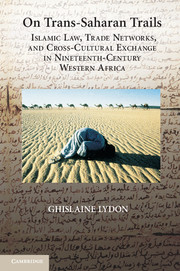 On Trans-Saharan Trails
On Trans-Saharan Trails Book contents
- Frontmatter
- Contents
- Acknowledgments
- Note on Language
- List of Abbreviations
- Glossary
- Maps
- 1 “Making History” Across the African Divide
- 2 Trans-Saharan Trade in the Longue Durée
- 3 Markets and the Movement of Caravans: Nineteenth-Century Developments
- 4 Guelmīm and the Wād Nūn Traders
- 5 The Organization of Caravan Trade
- 6 Business Practice and Legal Culture in a Paper Economy of Faith
- 7 Trade Networks and the Limits of Cooperative Behavior
- 8 On Trans-Saharan Trails
- Appendix 1 Nineteenth-Century Events
- Appendix 2 Pillaged Caravans Reported in the Chronicles
- Bibliography
- Index
5 - The Organization of Caravan Trade
Published online by Cambridge University Press: 02 July 2009
- Frontmatter
- Contents
- Acknowledgments
- Note on Language
- List of Abbreviations
- Glossary
- Maps
- 1 “Making History” Across the African Divide
- 2 Trans-Saharan Trade in the Longue Durée
- 3 Markets and the Movement of Caravans: Nineteenth-Century Developments
- 4 Guelmīm and the Wād Nūn Traders
- 5 The Organization of Caravan Trade
- 6 Business Practice and Legal Culture in a Paper Economy of Faith
- 7 Trade Networks and the Limits of Cooperative Behavior
- 8 On Trans-Saharan Trails
- Appendix 1 Nineteenth-Century Events
- Appendix 2 Pillaged Caravans Reported in the Chronicles
- Bibliography
- Index
Summary
When the Boötes star rises, the caravaners say: “let's go!” (Idha ṭalʿa al-ʿiwā' yagūl al-jamāl aīwā!)
Caravaners' sayingThe distance and the hardship of the road they travel are great. They have to cross a difficult desert that is made (almost) inaccessible by fear (of danger) and beset by (the danger of) thirst. Water is found there only in a few well-known spots to which caravan guides lead the way. The distance of this road is braved only by very few people.
Ibn KhaldūnIn an effort to recover the capital she had invested in a caravan venture, al-Ḥuriyya hired her brother Sāliḥ as her trade representative (wakīl). The year was 1292/1875, as per the contract she drew up with him, which was a time of relative peace and prosperity in the western Sahara, according to the local chronicles. While this agency contract does not state where al-Ḥuriyya was located, nor where her brother was to travel to collect her due, she was a Tikna woman who probably resided in either Shinqīṭi or Guelmīm from where she engaged in trans-Saharan trade with markets further south via proxy. Sāliḥ was to collect a debt owed to her that amounted to 142 gold mithqāls (or about 600 grams of gold), as well as an unspecified quantity of silver, some cloth, and her camels.
- Type
- Chapter
- Information
- On Trans-Saharan TrailsIslamic Law, Trade Networks, and Cross-Cultural Exchange in Nineteenth-Century Western Africa, pp. 206 - 273Publisher: Cambridge University PressPrint publication year: 2009


